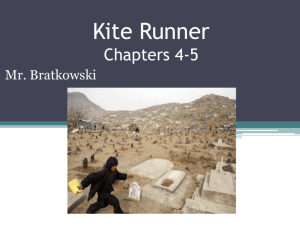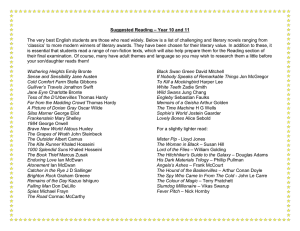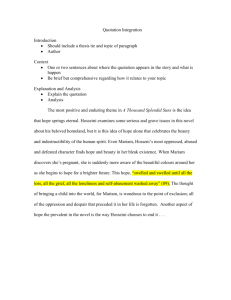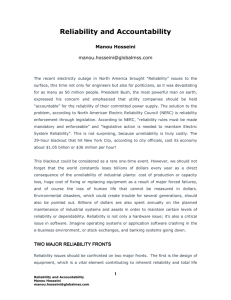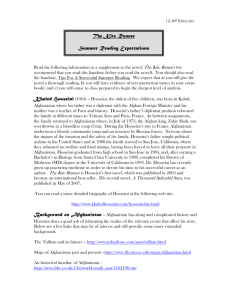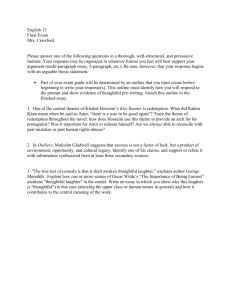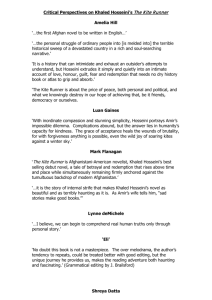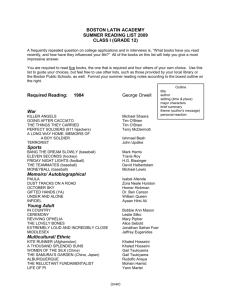The Kite Runner - Cloudfront.net
advertisement
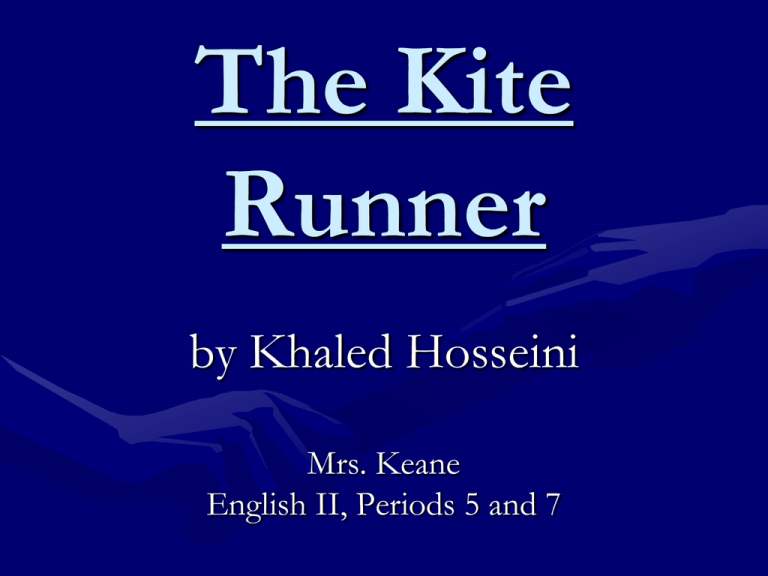
The Kite Runner by Khaled Hosseini Mrs. Keane English II, Periods 5 and 7 Chapters 1 & 2 “I became what I am today at the age of twelve, on a frigid overcast day in the winter of 1975. I remember the precise moment, crouching behind a crumbling mud wall, peeking into the alley near the frozen creek. That was along time ago, but it’s wrong what they say about the past, I’ve learned, about how you can bury it. Because the past claws its way out. Looking back now, I realize I have been peeking into that deserted alley for the last twenty-six years” (Hosseini 1). • What image in the author immediately creating in the opening scene of the novel? What do they say about retrospect? • What can we infer/information that we can glean from what the author has provided in his diction and tone? Chapter 1: Effect on the Reader??? • “There is a way to be good again. I looked up at those twin kites. I thought about Hassan. Thought about Baba” (Hosseini 2). – Why is it italicized? – What questions do we have? – Implies that he is going to outline his journey to his redemption throughout the last twenty-six years. • We can question ourselves: What do you remember in your own past that has the same effect on you or makes you the individual that you are today? Chapter 2: When do we stop being children??? • Why does Hosseini use the symbol of trees to open Chapter 2? What do they represent? • “Hassan never denied me anything” (Hosseini 4). - how is this a reflection on their relationship? • How does Hosseini portray Amir’s relationship with his father (5)? – When do we get invited to join “grown-ups’” time? Father-Figures: Baba vs. Rahim Khan • Who is Rahim Khan? (Hosseini 5) – Who is presented as Amir’s father-figure? Why? • Baba is constantly entertaining everyone he can other than his own son: “the dining room . . . that could easily sit thirty guests—and, given my father’s taste for extravagant parties, it did just that almost every week” (Hosseini 5). – He gives demands but is not there to enforce them (Hosseini 7): voluntarily chooses to be absent Other Absent Figures: Mothers • What could be the effects of not having a female/mother figure? • Why is Amir’s mother not in his life? (Hosseini 6) – Voluntary/Involuntary? Effect? • Why is Hassan’s mother absent? (Hosseini 6) – Voluntary/Involuntary? Effect? – an absent mother places the father in the spotlight . . . the good and the bad. How is Ali in the spotlight in positive and negative ways? Persecution • Why have individuals/groups throughout history been isolated and discriminated against? • What was a time that you are singled-out, stereotyped, isolated, etc.? Or you did this to someone else? Motivations? • Where do we get our information from? – “The book said a lot of things I didn’t know, things my teacher hadn’t mentioned. Things Baba hadn’t mentioned either. It also said some things I did know, like that people called Hazaras mice-eating, flat-nosed, loadcarrying donkeys. I had heard some of the kids in the neighborhood yell those names to Hassan” (Hosseini 9). – Media, teachers, parents, peers, etc.: Why do we accept what we are taught? What is Ali’s reaction to being taunted? • Quiet indifference: He “never retaliated against any of his tormentors” (Hosseini 10). Why? • Because unlike where the image of a baby kills Macbeth, it is a baby that saves Ali: Ali was immune to the insults of his assailants; he had found his joy, his antidote, the moment Sanaubar had given birth to Hassan . . . She hadn’t needed much help at all, because, even in birth, Hassan was true to his nature: He was incapable of hurting anyone . . . Out he came smiling (Hosseini 10). The Symbol of the Kite • The pair of kites in Chapter 1 is compared to a pair of eyes (Hosseini 2) and in Chapter Two we find “that eyes are windows to the soul” (Hosseini 8). • This concept of vision is a re-occurring theme throughout our texts: How/Why??? – – – – Lord of the Flies: Piggy = glasses Separate Peace: Gene = guilt, truth “The Secret Sharer”: captain = hides Leggatt “Macbeth”: Macbeth = to see and not to see; to see not what the hand is doing Symbol of Blood AGAIN • Do you have to been connected by blood to be connected as brothers??? “Then he would remind us that there was a brotherhood between people who had fed from the same breast, a kinship that not even time could break. Hassan and I fed from the same breasts. We took our first steps on the same lawn in the same yard. And, under the same roof, we spoke our first words. Mine was Baba. His was Amir. My name. Looking back on it now, I think the foundation for what happened in the winter of 1975—and all that followed— was already laid in those first words” (Hosseini 11).
